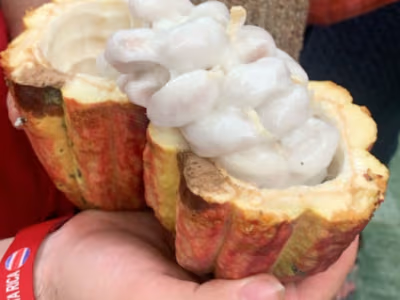The History of Political Corruption in Haiti
The history of modern Haiti began with Spanish settlers arriving
on the island of Hispaniola in 1492, bringing a myriad of diseases with them and
using Hispaniola for its natural resources, the Europeans cultivated sugar,
coffee, and timber. However, the Europeans plagued the native Hispaniola
population, the Tainos, resulting in a need to import slaves to support labor
efforts. They kidnapped people from west Africa, bringing them across the
Atlantic to perform forced labor. By the early 1600s, Hispaniola had proven to
produce lucrative exports, and world powers began setting up trading posts on
the island. France, in particular, found itself profiting from Hispaniola's
exports so much that it annexed “as the colony of Saint-Domingue” (Labrador
& Roy, 2021).
Nearly a century later, during the Age of Revolution, two
former slaves “led a rebellion against French rule that culminated with the
creation of Haiti in 1804” (Labrador & Roy, 2021). Haiti is, to this day, a
result of the only successful slave revolt in world history. It was the “first
postcolonial Black republic” which stood for progressive ideas such as
abolition, racial equality, and self-determination (Labrador & Roy,
2021).
Since its inception in 1804, Haiti has had consistent government
corruption. After Haiti declared its independence from France, revolutionary
leader Jean-Jacques Dessalines declared himself emperor, only to be
assassinated two years later (BBC, 2019). This left Haiti in a disarray,
dividing the Black and mulatto populations along the north and south of
the island, respectively. For nearly a century, the societal unrest was left
unattended as Haitian leaders failed to bring their fractured nation together.
After declaring itself a Western hegemon, the U.S. occupied Haiti in 1915 under
President Woodrow Wilson. While occupying Haiti, U.S. economic interests
benefited due to cheap labor, an abundance of natural resources, and access to
the Môle- Saint-Nicolas harbor. By the time the U.S. left Haiti two decades
later, Haiti was left in disarray and blamed for the injustices caused by the
U.S. The U.S. left Haiti with a slew of problems: racial tensions, unjust
policing, government corruption, and extreme poverty.
On the other hand, the U.S. left Haiti with the perfect conditions
to support a dictatorship. Despite withdrawing its troops from Haiti in 1934,
it maintained fiscal control until 1947 (BBC, 2019). During this time, racial
tensions between the Black and mulatto populations continued to rise
until they came to a head with the election of Francois “Papa Doc” Duvalier in
1957. Papa Doc successfully executed a coup d’etat in 1958, gained military
power, and implemented himself as President for Life in 1964. He was succeeded
by his son Jean-Claude “Baby Doc” Duvalier after his death in 1971 (Krebs,
1971). During the 28-year Duvalier regime, Papa Doc and Baby Doc were
responsible for the killings of “between 30,00 and 60,000 Haitians, and raped,
beat and tortured countless more” (Henley, 2010). They also bankrupted the
government because they “were at times embezzling up to 80% of Haiti's
international aid, while the debts they signed up to accounted for 45% of what
the country owed” in 2009 (Henley, 2010). The effects of bankruptcy left the
country “short on investment, and desperately short on most of the
infrastructure and apparatus of a functioning modern state” (Henley, 2010). The
Duvalier regime has affected the prospects for democracy to this day. It set a
precedent of government corruption, nepotism, extreme poverty, racial tensions,
and an overall lack of governance.
Since the Duvalier regime, Haiti has had difficulties maintaining
a stable government, as many Presidents have had short terms, been
assassinated, or been reelected repeatedly. The most recent Presidential
transition was on July 7, 2021 with the assassination of Jovenel Moïse
(BBC, 2022). The Haitian government is known for its nepotism, and many
government officials are known for appointing close friends or family members
into positions of power. And because Haitian government officials have been
known to embezzle money into their personal accounts, these closely integrated
friends and family are the richest in the nation. Government ministries may
have goals they want to accomplish that are indefinitely paused due to
political instability and a lack of funding. Haitian citizens continue to
advocate for fairer policies despite the government’s lack of means to make any
progress.
References
BBC. (2019, February 11). Haiti Profile - Timeline. BBC News. Retrieved from
https://www.bbc.com/news/world-latin-america-19548814
BBC.(2022, March 3). Jovenel Moïse Murder: Suspect handed over to Haiti. BBC News. Retrieved from https://www.bbc.com/news/world-latin-america-60601710
Henley, J. (2010, January 14). Haiti: A long descent to hell. The Guardian. Retrieved from https://www.theguardian.com/world/2010/jan/14/haiti-history-earthquake-disaster
Krebs, A. (1971, April 23). Papa Doc, a ruthless dictator, kept the Haitians
in illiteracy and dire poverty. The New York Times. Retrieved from https://www.nytimes.com/1971/04/23/archives/papa-doc-a-ruthless-dictator-kept-the-haitians-in-illiteracy-and.html
Labrador,
R. C., & Roy, D. (2021, September 17). Haiti's troubled path to development. Council on Foreign Relations. Retrieved from https://www.cfr.org/backgrounder/haitis-troubled-path-development
Like this project
Posted Jan 11, 2023
Spanish settlers arrived on the island of Hispaniola in 1492, bringing a myriad of diseases and exploiting natural its resources. Today, this is Haiti.
Likes
0
Views
16





